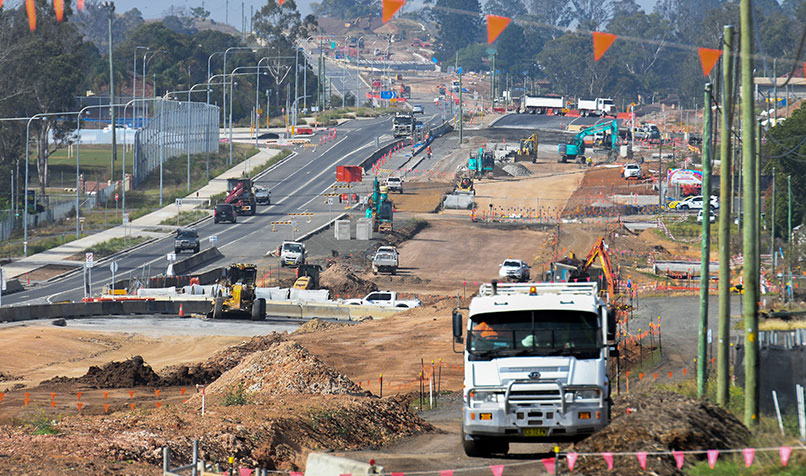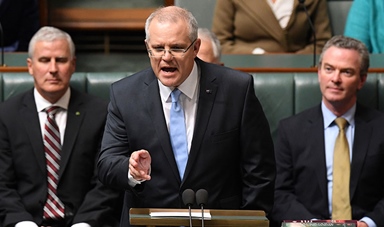Loading component...
At a glance
Read the full report: 2018/2019 Federal Budget Highlights
Federal Treasurer Scott Morrison delivered personal income tax cuts, incentives for small to medium-sized businesses, moves to keep older Australians working for longer and measures to curb the black economy.
The budget is forecast to move into surplus by 2019/20 from a A$18.2 billion deficit in 2017/18, but Morrison said Australians could not take a stronger economy for granted.
Gross domestic product is forecast to grow by 2.75 percent in 2017/18, accelerating to 3 per cent in 2018/19 and in 2019/20.
CPA Australia Head of policy Paul Drum said the budget had some big-ticket items but “it is the less headline-grabbing proposals that are likely to attract the attention of the accounting and tax profession over the coming months and years”.
“Tonight’s big spending on seniors and infrastructure, and plans for a personal tax cut are based on robust economic growth over the forward estimates,” he said.
Winners
Wage earners
Morrison’s tax strategy combines tax relief for low and middle-income earners, protection from bracket creep and making the personal tax system simpler.
From 1 July 2018, the top threshold of the 32.5 per cent tax bracket will rise from A$87,000 to A$90,000 which will prevent about 200,000 people from entering the 37 per cent tax bracket in 2018/19.
A new, non-refundable tax offset, in addition to the Low Income Tax Offset (LITO), will provide tax relief of up to A$530 to low and middle-income earners from 2018/19. The offset will be received as a lump sum on assessment after individuals lodge their tax returns.
The benefits provided by the low income tax offset (LITO) will be locked in by increasing the top threshold of the 19 per cent bracket from A$37,000 to A$41,000 and increasing the LITO from A$445 to A$645.
Wage earners will also benefit from deferral of plans to increase the Medicare levy, currently 2 per cent of taxable income, by 0.5 per cent, as proposed in the 2017 budget but not legislated. The move was first raised in 2012.
CPA Australia welcomed the individual income tax cuts, saying the benefits – although initially moderate – will trickle down to not only salary and wage earners and investors, but also all unincorporated businesses, as these business’ profits will be subject to individual rates also.
Entrepreneurs/small business
The Treasurer announced an extension of the A$20,000 instant asset write-off for another year, allowing businesses with turnover of up to A$10 million a year to claim an immediate deduction for a purchase of below A$20,000.
The write-off had been due to reduce to A$1000 on June 30, 2018.
CPA Australia has argued for the write-off to be made a permanent feature of the tax system because it encourages business to invest and create jobs, and has a positive flow-on for many retailers.

All employers
A raft of measures directed at older Australians will provide wage subsidiesof up to $10,000 for employers who take them on.
Morrison said the government will expand the Entrepreneurship Facilitators program, and create a new Skills and Training Incentive to provide mature age workers with the opportunity to update their skills.
Older Australians
The government is launching a scheme to help older Australians and the wave of baby boomers moving into retirement to draw on equity in their home in order to fund their retirement.
The Federal Pension Loan Scheme makes non-taxable loans, paid fortnightly up to the amount of the age pension. It will be extended to full rate pensioners and self-funded retirees, so they can boost their retirement income by up to $17,800 for a couple, without impacting on their eligibility for the pension or other benefits.
A significant number of Australians are asset rich but cash poor and CPA Australia says any measure to assist in unlocking equity in the family home is welcome.
“However, even with the increase in the maximum, the Pension Loan Scheme remains limited in its scope and attractiveness,” said Drum.
“Recognising and unlocking the equity in the family home is key piece of the retirement income puzzle. More needs to be done in this area.”
The Pensioner Work Bonus will be extended to encourage older people to stay in the workforce, so pensioners can earn an extra A$1300 annually within reducing their age pension payment. Self-employed individuals will be able to earn up to A$7800 a year.
In-home funding will be increased, with 20,000 extra care packages to help people stay in their homes rather than move into aged care.

Construction and engineering
The infrastructure spending boom continues with engineering and construction firms to benefit from major projects around the country.
A new A$1 billion Urban Congestion Fund will address “pinch points” to improve traffic flows in cities and a A$3.5 billion Roads of Strategic Importance initiative will upgrade key freight routes, adding to other previously-announced airport links and motorway upgrades.
Health
The medical sector will benefit from a new medical industry plan with support for research and drug trials.
There will be increased funding for mental health services and for doctors and nurses in regional and remote Australia.
Superannuation fund members
Changes include increasing the possible number of self-managed super fund (SMSF) members from four to six, caps on passive fees on small balance super funds, banning super fund exit fees, and changing the work test for those 65-74 years of age who make voluntary contributions to super.
The government will stop super funds from forcing people aged under 25 with low balances to pay for life insurance policies they did not ask for or need.
The government also announced a three-year audit cycle for SMSFs.
Losers
CPA members who are among the nation’s 80,000 tax agents and BAS agents will face increased costs under increased funding for the Tax Practitioners Board.
The black economy
In the context of the government’s response to the black economy taskforce review, there will be new compliance obligations for some businesses by further extending the TPRS (Taxable Payments Reporting System) to security and investigation services, road freight transport and computer design and related services.
There will be a A$10,000 limit on cash payments across the economy, to reduce money laundering and tax evasion.
Employers and contractors who do not meet withholding obligations will be denied tax deductions.
Morrison says the measures will bring in A$5.3 billion over the next four years.
Phoenixing activities
Tougher rules for illegal phoenixing activities are proposed, including increased liabilities for directors.
The Australian Taxation Office (ATO) will receive additional funding to ramp up its debt collection activities – for both tax and super liabilities.
Businesses using the research and development tax concession
There are potential losers from a crackdown on businesses using the concession, as the government forecasts savings of A$2 billion over four years by tightening access to the incentive.
CPA Australia notes this is a measure to improve the integrity of the tax system but is concerned about the unintended consequences and impact on often innovative startup entities and their ability to access the R&D incentives, said Drum.
“R&D claims have been reducing in recent times and to have a R&D scheme that is inaccessible is counterintuitive.”

Large businesses
At the top end of town there are changes regarding taxation of financial arrangements (TOFA), and extended definition of significant global entity (SGE) as well as changes to tax consolidation rules.
Changes to the thin capitalisation rules will ensure tax values are in accord with accounting financial reports also.
There are also changes proposed to remove access to CGT discount by managed investment trusts (MITs).
The Treasurer will release a discussion paper in a few weeks on how digital businesses should be taxed.
Changes are also proposed for stapled structures to prevent the conversion of trading income into more favorably treated passive income.
Missed opportunities
Income tax savings discount
“It’s regrettable the government has not taken the initiative to introduce measures that would encourage Australians to save outside the superannuation regime,” said Drum.
“CPA Australia supports the introduction of an income tax savings discount on savings earned/derived outside of the super regime as first proposed in the Australia’s Future Tax System report (the Henry Tax Review). Such a measure would provide improve overall household savings, encourage investment and make it easier for Australians to make larger capital purchases,” he said.
“This budget was also the ideal opportunity for the government to commit to initiating a review of the Federal Government’s compensation for defective administration scheme, and include an increase in the compensation available to those affected.”

